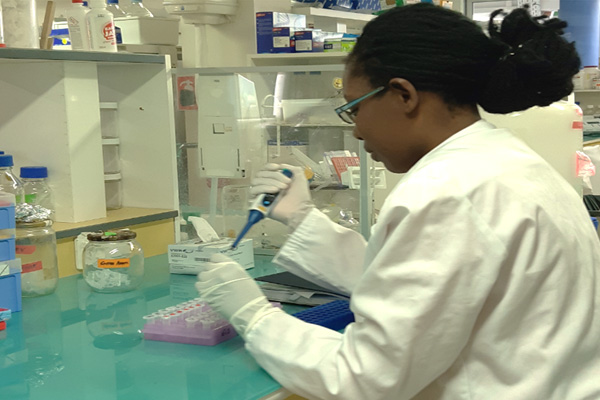This study aims to evaluate whether or not selected acetic bacteria strains could optimally perform fermentation at high temperature with ordinary laboratory materials without adjusting growth temperature. Vinegar production was carried out by controlled successive alcoholic and acetous fermentation in batch mode. Progress of fermentation was monitored by using various biochemical tests. Cashew apple vinegars quality was determined by sensory analysis. The selected acetic acid bacteria strains produced maximum acid after the 2nd day of acetic fermentation. The produced vinegars had an acidity of 5.34±1.07-5.86±0.07 acetic acid g/100mL, productivity 0.74±0.15-0.81±0.01 g/Lh and pH 3.15±0.09- 3.19±0.07 respectively. The end of the fermentation was noticed by a decrease in acidity that occurred after the 3rd day. Sensory evaluation rated the vinegar acceptable in terms of astringency, pungency and acidity when compared to commercial samples. Thus, the use of thermotolerant bacteria to prepare commercial-grade vinegar from cashew apple, commodities without economic value, has potential to scale up to domestic use.
Keywords: thermotolerant, acetic acid bacteria, vinegar, sensory analysis, cashew apple
L’objectif de cette étude est d’évaluer la capacité des souches de bactéries acétiques sélectionnées à croitre de façon optimale dans des conditions expérimentales qui ne nécessitent pas une régulation de la température pendant la phase d’acétification. La production de vinaigre s’est faite par une double fermentation alcoolique et acétique contrôlée en mode discontinu. Le suivi de la fermentation a été fait par des tests biochimiques. L’acceptabilité des vinaigres produits a été déterminée per une analyse sensorielle. Les souches de bactéries acétiques sélectionnées ont permis d’accumuler le maximum d’acide acétique dans des délais records en 72 heures de fermentation. Les vinaigres présentent une acidité de 5,34±1,07-5,86±0,07 acide acétique g/100mL, une productivité de 0,74±0,15-0,81±0,01 g/Lh et pH 3,15±0,09- 3,19±0,07. La fin de l’acétification est indiquée par le phénomène de suroxydation qui se traduit par une baisse en acidité à partir du 3ème jour. Les échantillons de vinaigre ont été jugés acceptables en termes de d’astringence, de notes piquantes et d’acidité comparativement aux échantillons du commerce. De ce fait, l’utilisation de bactéries acétiques thermo tolérantes à forte production d’acide pour la production de vinaigre avec la pomme de cajou, produit sans valeur marchande, a le potentiel d’être exploité à l’échelle artisanale.
Mots clés: thermotolérant, bactéries acétiques, vinaigre, analyse sensorielle, pomme de cajou.
DOI:https://doi.org/10.26167/8qgz-bd08
Received: February 28th 2020 Revised: May 17th 2020 Accepted: May 18th 2020 Published:june 2nd 2020

infosim@sim-ivoire.com
+225 43 85 33 32 / 57 11 13 72
08 BP 2300 Abidjan 08
Views:
Download:
